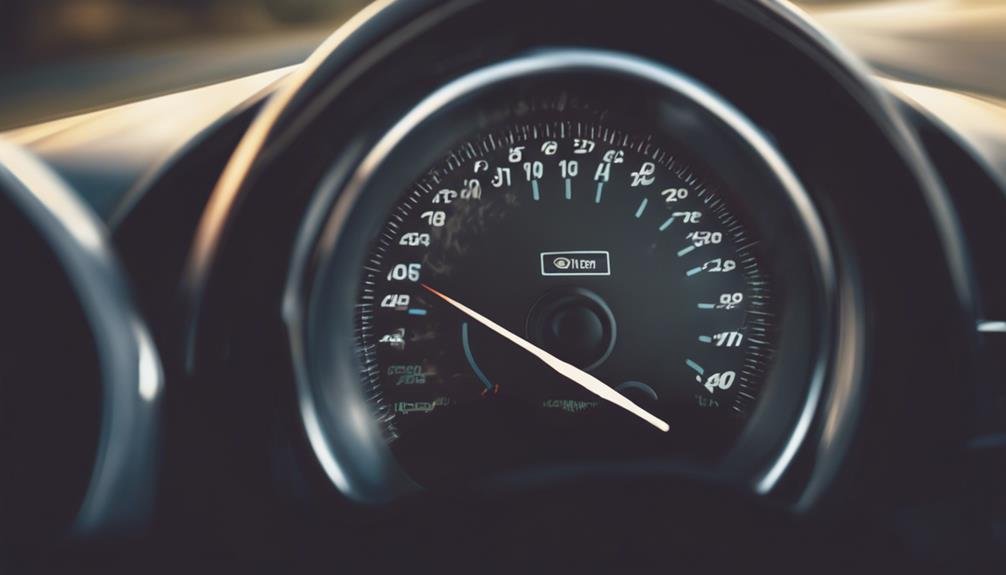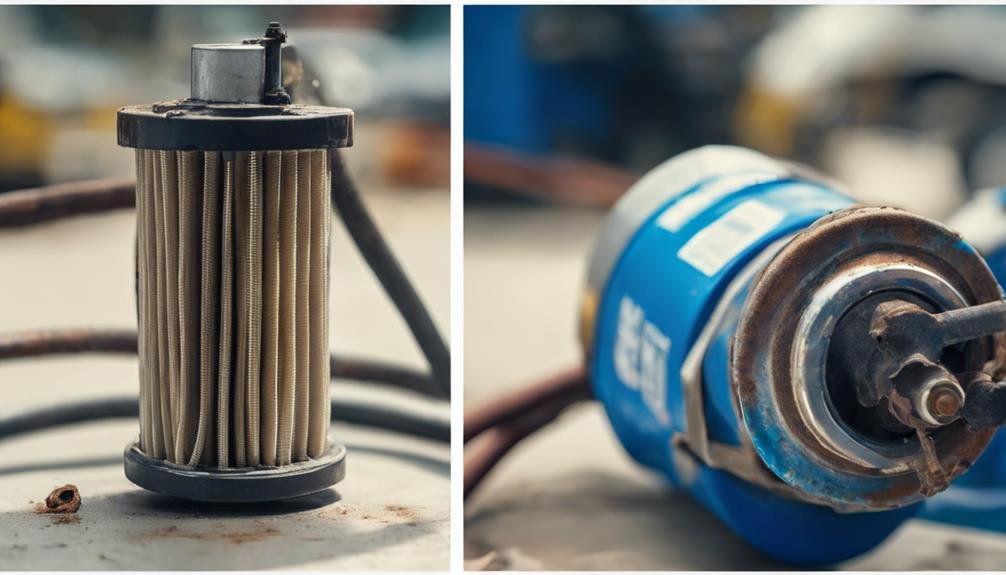As you drive, your vehicle relies on a steady supply of fuel, and if your fuel pump is failing, you may notice a range of warning signs that indicate it's going bad. You might hear a loud whining noise from the fuel tank, especially when the fuel level is low or contaminated. Difficulty starting the engine, engine sputtering or stalling, and loss of power or acceleration are also common signs. You may also experience surging or bucking sensations, decreased fuel efficiency, or engine stalling or failure to start. If you're experiencing these issues, it's important to address them promptly to prevent further damage; exploring these signs further can help you better understand what's happening under the hood.
Key Takeaways
- A whining noise from the fuel pump area, especially when the fuel level is low or contaminated, indicates a potential issue.
- Difficulty starting the engine or engine stalling are common signs of fuel pump problems that require prompt attention.
- Engine sputtering, loss of power, or surging sensations while driving can be indicative of a failing fuel pump.
- Decreased fuel efficiency, such as needing to fill up more frequently, can be an early sign of fuel pump issues.
- Unusual noises, performance issues, or surging/bucking sensations while driving are all warning signs that your fuel pump may be going bad.
Whining Noise From Fuel Pump
If you notice a loud whining noise coming from your fuel tank, particularly when the fuel level is low or the fuel is contaminated, it could be a sign that your fuel pump is going bad.
A normal fuel pump operation produces a low hum, not a loud whine. The whining noise is often more pronounced when the fuel level is low or if the fuel is contaminated, which can put additional stress on the fuel pump.
If you hear a persistent whining sound, it may be a sign that your fuel pump needs attention. Ignoring this symptom can lead to engine performance issues down the road.
A failing fuel pump can cause your engine to struggle, leading to poor performance, decreased fuel efficiency, and even engine stalling. By addressing a whining fuel pump early, you can prevent these problems and avoid costly repairs.
Difficulty Starting the Engine
You may have trouble starting your engine, a common symptom of a failing fuel pump that struggles to push enough gas to the engine.
If your car cranks but doesn't start, it could indicate fuel pump problems. A bad fuel pump may struggle to generate enough pressure to pump fuel through the fuel system, leading to starting issues.
Worn fuel pumps lose pressure over time, making it harder to start your car. Ignoring these difficulties can worsen the problem, potentially causing engine damage.
As your fuel pump deteriorates, you may notice it takes multiple attempts to start the engine, or it may take a while to turn over. This is because the fuel pump is having trouble providing enough fuel to the engine.
If you're experiencing trouble starting your car, addressing the issue promptly is crucial to prevent further damage to your fuel system and engine.
Engine Sputtering or Stalling

As you're struggling to start your engine, you might also notice your car's engine sputtering or stalling, which is another common sign of a failing fuel pump. This is because a bad fuel pump can't provide a consistent fuel supply, leading to performance issues.
When driving, you might experience hesitation, jerking, or stalling, especially during acceleration. These problems can occur at different speeds, making it important to address the issue promptly.
Ignoring engine sputtering or stalling can have severe consequences, including complete engine failure. A failing fuel pump's inability to deliver fuel efficiently can cause your engine to stall, putting excessive strain on the engine and its components.
If left unchecked, this can lead to catastrophic engine failure, resulting in costly repairs or even requiring a new engine. It's vital to recognize the signs of a failing fuel pump, including engine sputtering or stalling, to avoid more severe problems down the road.
Loss of Power or Acceleration
Sudden loss of power or acceleration while driving can be a telling sign that your fuel pump is on its way out. If you notice your vehicle is struggling to accelerate, or you feel a sudden decrease in power, it could be a sign of a failing fuel pump.
A weak or failing fuel pump may struggle to deliver enough fuel to the engine, resulting in poor acceleration and sluggish performance. Reduced fuel pressure from a bad fuel pump can lead to a loss of power, making it difficult to accelerate or maintain speed.
If you experience a sudden decrease in power while driving, it could be a sign that your fuel pump is going bad and needs to be replaced. Ignoring these bad fuel pump symptoms can lead to more serious problems down the road.
If you're experiencing loss of power or acceleration, it's crucial to have your fuel pump checked and replaced if necessary to avoid more costly repairs. Don't wait until it's too late – address these signs of a bad fuel pump, and consider fuel pump replacement to get your vehicle running smoothly again.
Surging or Bucking Sensations

While a loss of power or acceleration can be a telling sign of a failing fuel pump, another symptom to watch out for is surging or bucking sensations while driving, which can indicate that your fuel pump is struggling to maintain a consistent flow of fuel to the engine.
When your fuel pump is failing, it may struggle to provide a steady supply of gasoline, leading to surges or jerks that can be unsettling and affect your driving experience. You may notice these sensations more at higher speeds or when accelerating, as the engine demands more fuel to perform efficiently.
If you're experiencing surging or bucking, it's crucial to address the issue promptly to prevent further damage to the fuel pump and ensure smooth driving. A failing fuel pump can disrupt proper engine performance, leading to decreased performance and potentially more severe problems down the road.
Decreased Fuel Efficiency
You may be filling up more frequently than usual, and that's because a failing fuel pump can lead to decreased fuel efficiency, resulting in more trips to the gas station.
A bad fuel pump can notably decrease your vehicle's fuel efficiency, forcing you to fill up more often. This drop in mileage between fills is a common indicator of a bad fuel pump, suggesting that the pump isn't delivering the proper amount of fuel to the engine.
As your fuel pump starts to fail, you may notice a marked decrease in your vehicle's total fuel consumption. Poor fuel efficiency can be a clear sign that the fuel pump is struggling to maintain the necessary fuel pressure, leading to reduced fuel efficiency.
Monitoring your fuel efficiency can help you detect early signs of a failing fuel pump and address the issue promptly. If you're experiencing low fuel efficiency, it may be worth performing a fuel pressure test to diagnose the issue.
Keep an eye on your fuel consumption, as decreased fuel efficiency can be a key indicator of a bad fuel pump.
Engine Stalling or Not Starting

One telltale sign of a failing fuel pump is when your engine stalls or refuses to start, often leaving you stranded and frustrated. This can be a sign that your fuel pump is struggling to deliver fuel to the engine, leading to intermittent stalling or the engine not starting at all, especially when the car is low on fuel.
Here are some common signs of fuel pump issues related to engine stalling or not starting:
- Intermittent stalling: If your engine stalls occasionally, especially when you're low on fuel, it could be a sign of a failing fuel pump.
- Difficulty starting the engine: If you're having trouble starting your engine, followed by stalling, it may indicate fuel pump issues affecting the engine's fuel supply.
- Engine not starting at all: If your engine refuses to start, it's important to have the fuel pump inspected, as it plays a significant role in delivering fuel for combustion.
Ignoring these signs can lead to potential safety hazards and costly repairs related to fuel pump failure. It's crucial to address these issues promptly to avoid more severe problems down the road.
Fuel Pump Failure Warning Signs
When your car exhibits unusual behavior, such as stuttering or stumbling intermittently, it may be sending you a warning sign that your fuel pump is on the verge of failure. This irregular performance could be a sign that your fuel pump is going bad.
Another indication of a failing fuel pump is an excessive whining noise coming from the fuel pump area. If you notice this unusual sound, it's important to investigate further.
Difficulty starting the engine or the engine not responding to the throttle may also indicate a bad fuel pump. Moreover, unexpected car cuts off or frequent engine stalls can be attributed to fuel pump issues.
Additionally, observing lower gas mileage or experiencing power loss while driving are signs that your fuel pump may be going bad. As a vehicle owner, it's vital to recognize these warning signs to avoid being stranded on the roadside.
Identifying Fuel Pump Problems

Identifying fuel pump problems early on can save you from a world of trouble, as recognizing the warning signs can help you address the issue before it leaves you stranded.
If your fuel pump is going bad, you may notice some telltale symptoms. Here are a few to watch out for:
- Unusual Noises: A high-pitched whining noise coming from the fuel tank area may indicate fuel pump issues. This noise could be a sign that the fuel pump is struggling to supply fuel to the engine.
- Performance Issues: Difficulty starting the engine or frequent stalling could be symptoms of a bad fuel pump. If your car sputters or hesitates while driving, it could be a sign that the fuel pump can't supply enough fuel to the engine.
- Other Signs: Loss of power or surging/bucking while driving may point to fuel pump problems. A faulty fuel pump can also cause a clogged fuel filter or issues with the fuel pump relay, leading to in-tank fuel pump failure.
Frequently Asked Questions
How Do I Know My Fuel Pump Is Bad?
You're wondering if your fuel pump is bad, and rightly so! Pay attention to whining noises, difficulty starting the engine, stalling, sputtering, poor fuel efficiency, and surging issues – these signs will give you your answer.
What Happens Before a Fuel Pump Goes Out?
Before your fuel pump goes out, you may notice a high-pitched whine, sputtering, or power loss while driving, and difficulty starting the engine, indicating it's on its way out.
Does the Fuel Pump Give Warning Before Going Out?
You're wondering if your fuel pump gives warnings before it fails. Typically, yes, it does – you might notice unusual noises, sputtering, or difficulty starting the car, which can signal a failing fuel pump.
Can a Fuel Pump Run but Still Be Bad?
You might think a running fuel pump is functioning properly, but it can still be bad, failing to maintain pressure or provide adequate fuel flow, leading to engine performance issues, even if it's still running.
Conclusion
As you've learned, a failing fuel pump can manifest in different ways, including whining noises, starting difficulties, and decreased fuel efficiency.
If you've identified with any of these signs, it's essential to address the issue promptly to avoid further complications.
Remember, a faulty fuel pump can lead to more severe engine damage or even complete failure, resulting in costly repairs or even replacement.
Stay vigilant, and don't hesitate to consult a professional mechanic if you suspect fuel pump problems.
